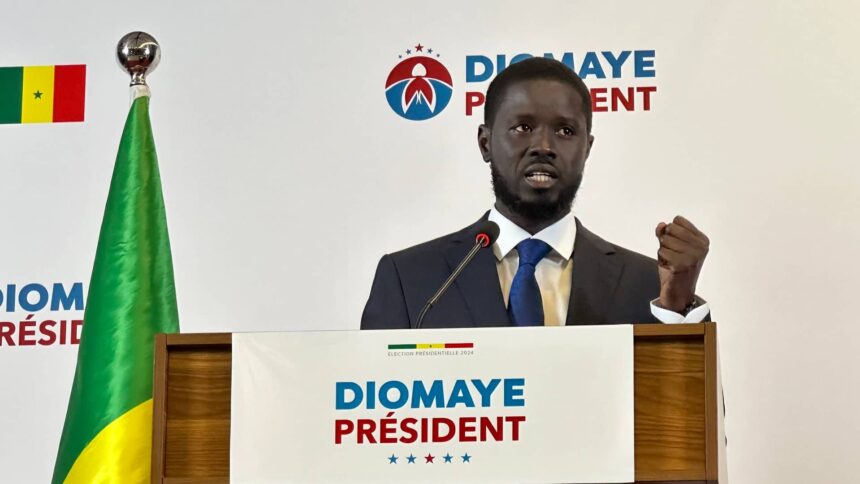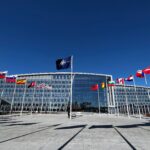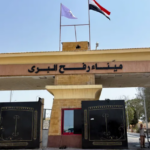Elected with over 54% of the vote in the first round on March 24th, Bassirou Diomaye Faye, candidate for the African Patriots of Senegal for Work, Ethics and Fraternity (PASTEF) party, has become, at the age of 44, the youngest president in the country’s history. Presented as an anti-system opponent, the man who was in prison until a few weeks ago embodies a new political impetus among young Senegalese. What analysis can be made of the election results? What are the new Senegalese president’s national and international political orientations? Caroline Roussy, director of research at IRIS, in charge of the Africa/s programme, provides some answers.
After the postponement of the presidential election decreed by Macky Sall at the beginning of February, the Senegalese election took place on March 24th and was marked by the victory of Bassirou Diomaye Faye. What lessons can be drawn from these results and the opposition’s victory?
Several lessons can be drawn from this sequence. Macky Sall had wanted to postpone indefinitely the presidential election initially scheduled for 25 February, for reasons that were not very transparent. Under pressure from the street, the religious authorities, international diplomacy and, above all, the Constitutional Council, President Sall was forced to organise the poll before 2 April, the date on which his term of office expires. While during this period of uncertainty the doomsayers predicted the end of Senegalese democracy and a possible military coup, the country was able to show that its institutions were solid and that the Senegalese people were viscerally attached to the presidential ballot as much as to political changeover.
The victory of PASTEF, Ousmane Sonko’s party, was predictable. They had already had enough of Sall’s governance, of his authoritarian turn over the past three years, with demonstrations bloodily repressed in March 2021, June 2023 and more recently in February 2024; hundreds of political opponents languishing in jails, journalists being harassed and the impression that the Republic had become the property of Macky Sall and his clientele. Opposing him was Ousmane Sonko, a young man with a reformist, sovereignist outlook, a desire to turn the tables on politics and, above all, young people in need of hope. Ousmane Sonko was prevented from standing for the presidency, but the enthusiasm he has generated over the last few years and the narrative he has been able to create with the young and not-so-young alike have been transferred to « his plan B » Bassirou Diomaye Faye. Undoubtedly, the rejection of Macky Sall, from which his candidate Amadou Ba suffered, and the desire for change explain this victory in the first round with nearly 55% of the vote. It is true that analysts and observers were not expecting such a tsunami, such a PASTEF plebiscite. Instead, a two-round ballot was envisaged. It has to be said that the momentum for change won out just as much as the desire to put Macky Sall behind him.
Be that as it may, we saw the great republican elegance of candidate Ba, who congratulated his opponent and wished him every success even before the results were officially announced. Senegal is confirming that it is a democratic country. It shows that change can come through the ballot box. A breath of fresh air in West Africa when some governments are tempted by military or constitutional coups.
In his inaugural speech on 2 April, Bassirou Diomaye Faye promised « systemic change » in Senegal. What national direction has the President announced? What are the expectations of the Senegalese people?
What’s interesting at this stage is that it’s still difficult to make the link between candidate Faye’s programme, which is entirely focused on asserting Senegal’s sovereignty in economic, monetary and agricultural matters, and hence systemic change, and the concrete expectations of the Senegalese people. One of the first changes expected is a reduction in the cost of living. We need to take stock of the very precarious situation in which a large part of the population finds itself. The minimum wage is 65,000 CFA francs. Rice with fish (thiep) costs 1,000-15,000 CFA francs. This order of magnitude is enough to demonstrate just how difficult the daily lives of the Senegalese people are. Another expectation is the employability of young people. The market is not capable of absorbing new entrants. There is also a mismatch between the training on offer to students and the needs of the market. Another very strong expectation is the renegotiation of fishing agreements with the European Union, in particular. Trawlers are emptying territorial waters of fish. Fishermen’s livelihoods have been severely affected by these practices, and their income has fallen by a factor of at least three, if not more, in recent years. Many of the fishermen have decided to go into exile, even if it means taking to the water in makeshift canoes. There are many other expectations, but these are the ones that can be classed as priorities. It is interesting to note that in his address to the nation on April 3rd, the eve of Independence Day, the President’s first words showed that he had heard, listened and wanted to respond to these expectations. What measures will he be able to adopt in the coming weeks to respond to these expectations in concrete terms? We will no doubt know more once we know the composition of the new government led by Ousmane Sonko and the programmatic orientations and their deadlines are specified.
In PASTEF’s programme, and as confirmed by the President, there is a desire to change the institutions to prevent the regime becoming too presidential and to prevent the abuses of the previous mandate. There is a desire to renegotiate oil and gas contracts. The question of the feasibility of this renegotiation, with multinationals armed with legal experts and lawyers, is a matter of debate. It remains to be seen what the renegotiations will entail. Finally, on the CFA franc, both the President and his Prime Minister seem committed to putting an end to this monetary system, but at what pace? In what area: ECOWAS, the franc zone, the national level? Do they want to go further than the proposal by Togolese economist Kako Nubukpo, who initially suggested a change of name? At this stage, there are still many questions.
While his predecessor Mack Sall had maintained good relations with the West and France, what regional and international political line will the new Senegalese president take?
Until a few weeks ago, President Faye was in prison. With Ousmane Sonko, a new tandem has come to power. Perhaps we should give them time to take up their respective positions. For the time being, there is no sign of any desire to sever relations with the West, or more particularly with France, Senegal’s leading economic and financial partner. Moreover, President Faye has stated that he wants « virtuous, respectful and mutually productive cooperation ». Admittedly, in 2024, this call for equality and justice is not exactly revolutionary, except for those who are committed to relations of integrated domination. It merely highlights the need to recalibrate and rebalance relations. France seems to have come to terms with this. President Macron has said that he is looking forward to working with the new authorities. Of course, some people are concerned about the rather harsh comments made by Ousmane Sonko in the past. Just two years ago, he bluntly declared that « it’s time for France to lift its knee from our neck », referring to George Floyd’s « let me breathe » and adding « it’s time for France to leave us alone ». It seems that since then he has seriously tinkered with his speech. As mayor of Ziguinchor, he supported and welcomed the opening of an Auchan shop in his town, despite the fact that it is seen by some as a symbol of French economic tutelage – remember that the store was ransacked and looted during the demonstrations in March 2021. There is often a gap between the rhetoric of the opposition, which is sometimes a little demagogic and populist, and the reality of the exercise of power, and this is no African trait… In the event of an economic crisis, could anti-French rhetoric be used by those in power to deflect any critical assessment of their own policies? It could. Just as it is possible that the renegotiation of the partnership between Senegal and France could serve as an example for the reinvention of ties between France and African countries.
Le point de vue de Caroline Roussy
Translated by Deepl.
Source: French Institute for International and Strategic Affairs (IRIS)







